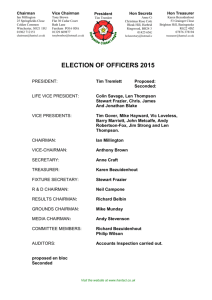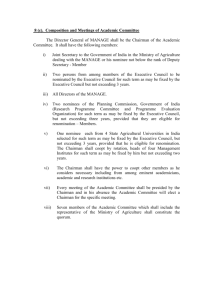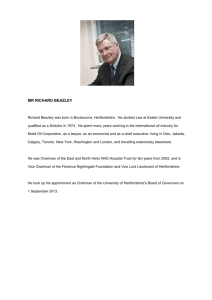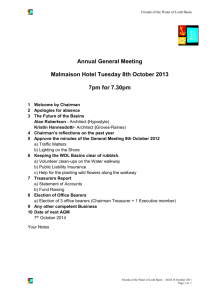speech day - University of Education, Winneba
advertisement
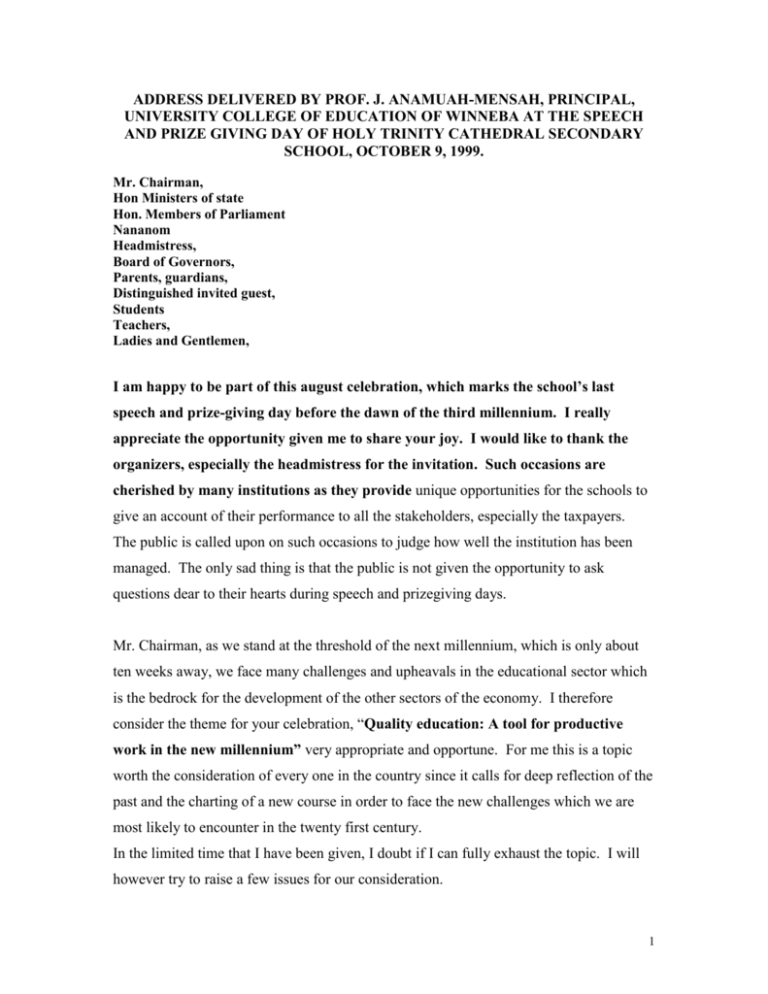
ADDRESS DELIVERED BY PROF. J. ANAMUAH-MENSAH, PRINCIPAL, UNIVERSITY COLLEGE OF EDUCATION OF WINNEBA AT THE SPEECH AND PRIZE GIVING DAY OF HOLY TRINITY CATHEDRAL SECONDARY SCHOOL, OCTOBER 9, 1999. Mr. Chairman, Hon Ministers of state Hon. Members of Parliament Nananom Headmistress, Board of Governors, Parents, guardians, Distinguished invited guest, Students Teachers, Ladies and Gentlemen, I am happy to be part of this august celebration, which marks the school’s last speech and prize-giving day before the dawn of the third millennium. I really appreciate the opportunity given me to share your joy. I would like to thank the organizers, especially the headmistress for the invitation. Such occasions are cherished by many institutions as they provide unique opportunities for the schools to give an account of their performance to all the stakeholders, especially the taxpayers. The public is called upon on such occasions to judge how well the institution has been managed. The only sad thing is that the public is not given the opportunity to ask questions dear to their hearts during speech and prizegiving days. Mr. Chairman, as we stand at the threshold of the next millennium, which is only about ten weeks away, we face many challenges and upheavals in the educational sector which is the bedrock for the development of the other sectors of the economy. I therefore consider the theme for your celebration, “Quality education: A tool for productive work in the new millennium” very appropriate and opportune. For me this is a topic worth the consideration of every one in the country since it calls for deep reflection of the past and the charting of a new course in order to face the new challenges which we are most likely to encounter in the twenty first century. In the limited time that I have been given, I doubt if I can fully exhaust the topic. I will however try to raise a few issues for our consideration. 1 INTRODUCTION Mr. Chairman, like many other countries, education in Ghana is seen as the bedrock for the socio-political and economic development of the country. Many countries such as Japan, and South Korea have succeeded in using education as the magic potion in their quest for development. It is interesting to note that such feats were achieved with education of high quality. Mr. Chairman, after 43 years of self rule, and despite the rich and abundant natural resources, the country continues to face serious problems of underdevelopment characterized by high infant and maternal mortality ratios of 71 deaths out of 1000 live births and 740 per 100,000 live births respectively. Also 40% and 44% of the population still do not have access to health services and safe water respectively. About six million people live below the poverty line, that is, not having three square meals a day, while thirteen million are engulfed by insanitary conditions. A significant chunk of the adult population ( 35.5% ) remains illiterate. As a country we have no choice but to carry this baggage with us into the new millennium. One may then ask why our education has over the years failed in helping to equip people to solve their own personal problems as well as societal problems.. QUALITY OF EDUCATION Mr. Chairman, the system of education bequeathed to us by the colonial masters, the British, seemed in those days to respond appropriately to the societal demands of the country. Over the years this eurocentric education, trained people for white-collar jobs and had great support and following up to the 50s and 60s. It did not equip the graduates to deal with problems affecting their day to day activities and that of the community. However, as the graduates of the school system realized that the white-collar jobs for which they had been prepared were no more available or easy to come by, people became dissatisfied. A crisis ensued which initially led to the Dzobo committee’s report on the new content and structure of education and finally to the educational reform of 1987 with its addendum, the fCUBE. The educational reform was intended to give a new direction 2 to our educational system by relating the school curriculum at the pre-university level to the world of work; introducing cultural elements into the curriculum; giving emphasis to science and technology, and making graduates more creative in their outlook. It was also intended to bring quality into instructional delivery and management of institutions, and to ensure increase in access for all especially females. A lot has been done to improve the system. For example, new syllabuses and textbooks have been written by indigenous Ghanaians, new subjects have been introduced, there has been a considerable growth in enrolment at the junior and senior secondary levels, there has been improvement in the supply of textbooks especially at the basic level, and increase in community participation in the funding of education. But after nearly 12 years of the educational reform movement, we are still talking about quality in our educational system. Does this mean that the educational reform has failed? Teachers, policy makers, parents, guardians and employers have in recent times been worried about the decline in the performance of students in examinations, namely, the criterion referenced test, Baseline Surveys, Basic Education Certificate Examination(BECE) and Senior Secondary School Certificate Examination(SSSCE). For example, the results of the criterion referenced tests since 1992 indicate that less than 10 percent of primary six pupils in public schools exhibited mastery of the English Language while less than 5 percent exhibited mastery in mathematics. The results of the BECE exams reveal that performance of JSS pupils is low in English Language, science and mathematics. Their inability to communicate well in English affects their performance in other subjects. Examination results at the senior secondary level have been equally poor, especially in English Language, science, and mathematics. It is gratifying to note, Mr. Chairman, that since 1997, there has been a steady improvement in the performance of the students in these and other subjects in the school. However the overall picture for the country is very disappointing-- more than half of the SSS graduates fail to gain entry into the universities and other tertiary or trade institutions or even be employable. This, added to the high percentage of JSS graduates who find themselves neither in schools nor employment, 3 creates a large army of young people who may end up selling dog chains at busy street intersections or teaming up with drug traffickers and armed robbers. Indeed this is a time bomb, which should be diffused before it is too late. Mr. Chairman, quality education for productive work requires the following: It should Equip students to learn how to learn ( and not just learn facts and recall them) Prepare students to meet the socio-economic and political needs of the nation. Quality education should bring out qualitative changes in the economic, social, political and cultural development of the country. Assist students to acquire marketable skills Unearth the creative talents which are dormant or hidden in the students Assist students to develop critical thinking and problem solving skills Make individuals scientifically and technologically literate Develop high moral standards in students Help students to acquire desirable attitudes Provide students with skills that will enable them to transform knowledge produced elsewhere. With the increasing knowledge production on the WorldWide Web, the challenge in the new millennium is the ability to reconstruct existing knowledge and make it applicable to local conditions. Achieving quality education What should we do to achieve quality education? We need to ensure that our children, whether they are in rural or urban areas or whether males or females, acquire basic communication and mathematical skills after the first nine years of basic education. Mr. Chairman, quality education for productive work can be achieved if the following are taken into consideration: Employment of well trained, and motivated teachers in adequate numbers. It is said that the quality of any education can be identified in the quality of its teachers. Most of the training takes place in the field, the workplace to ensure that the appropriate skills are developed. 4 We need to set benchmarks or standards of performance for each grade level. The benchmarks identify basic cognitive and psychomotor skills that a student should have at each stage before proceeding to the next stage. Teachers can then teach to ensure that students attain them. Curriculum is biased towards industry and business. Emphasis is placed on science and technology The development of the curriculum should not be the sole preserve of teachers, university dons and personnel of CRDD of the Ghana Education Service. Industry and business, the community and parents should be equal partners with the traditional curriculum developers in curricular construction. There is a greater need now for community involvement in the running of schools—as parents we need to be interested in the education of our children; community should have a say in what its children learn. Adequately trained Career Guidance and Counselling personnel to assist students in the choice of subjects, offer emotional support, etc. Special education personnel with skills to identify and manage learning disabilities in the regular classroom should be employed in every school. Adequate funding for workshops, laboratories and equipment to allow for students’ activities. It has been realized that the government alone cannot shoulder the responsibility of funding education.The 35 percent of the national budget which the government provides is grossly inadequate. These days we talk about cost sharing. At the basic level the district assemblies, donor agencies and NGO’s are playing important roles. The situation is more critical at the University level where manpower needed for development is trained and where the cost of training is also very high. Unless all stakeholders --beneficiaries, parents/guardians, industry and NGOs contribute towards the cost of university education, the quality of our education will continue to go down. Currently the cost of training a student in a science and technology based programme including medicine at the universities is on the average 8.27 million while that for a student in the humanities is 3.9 million. The universities are receiving only about 35% of this. But in spite of this and coupled with the deteriorating conditions of the teaching facilities, enrolment continue to increase resulting in a “pressure cooker” situation. 5 In a world, which is rapidly becoming a global village as a result of the development of sophisticated communication technologies, there is the need for all students to be computer literate and to be able to access information on the Internet. This is where private computer companies can come in to set up computer labs in secondary schools for reasonable fees. They should see this as their contribution to the provision of quality education in our schools. The teachers can use this facility to give assignments to students, provide uninterrupted feedback, give tests, keep a database on students and make continuous assessment more teacher friendly. With the increasing numbers of students knocking on the doors of the universities, distance learning should be approached with all seriousness. Funds should be sought to enable the universities to develop the course materials including on-line course materials and regional centers. CONCLUSION Mr. Chairman, our education is going through a very critical evolutionary phase involving major upheavals akin to birth pains—we are passing from a period when secondary education was essentially single track to a multi-trajectory system; a period where the government was the sole provider of funds for education to cost sharing among key stakeholders and beneficiaries, a period of decline in quality of education at all levels. There is also the global economic trends which tends to stiffle development in countries like ours. It behoves on all concerned citizens to re-examine our education and produce comprehensive blueprint which would guide the practice of education. We have seen that the quality of our education has declined to the extent that graduates of the basic, secondary and tertiary education cannot find jobs. I am afraid that the new millennium will present greater challenges that can only be met through qualitative education. The present state of education cannot propel us to become a middle level income country by the year 2020. We need a new paradigm shift where education is seen as a business enterprise which requires massive financial input and the participation of all. 6 Now, a word for you students. You have been sent here by your parents and guardians to be trained to become useful citizens in the country; they are spending quite a lot of money on you. Do not disappoint them; study hard and eschew anything that can disrupt your studies such as use of drugs, destruction of school property and other immoral practices. You are the future leaders of the nation. Let the elder know that this country would continue to have a bright future when the baton of leadership is given to you. I will like to congratulate the teachers for their high moral standard and dedication to work. Looking through the school’s report for the past two years I feel confident that if the present trend continues, this institution would be counted among the very best in the country. CONGRATULATION! I wish to once again express my sincerest thanks to the Headmistress, staff , Board of Governors and the PTA of the school for this invitation. May God richly bless you. THANK YOU 7

